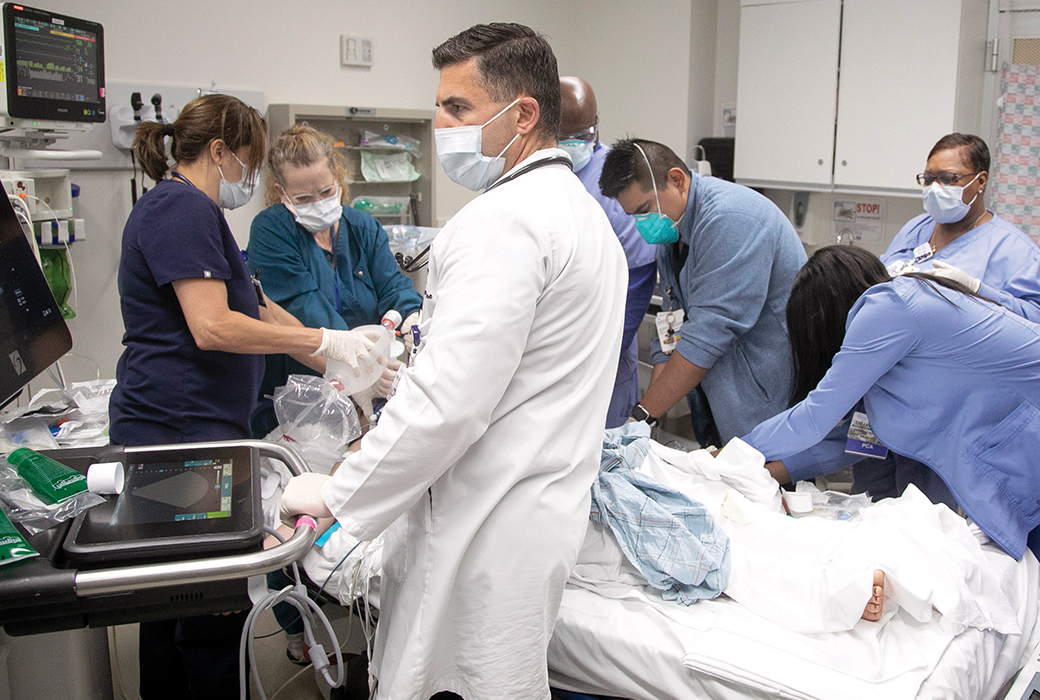
Photo by Aristide Economopoulos<
"We Suffer in Solidarity."
DR. JOHN D'ANGELO, DO
Chair of Emergency Medicine, Vice President, Chief Medical Officer
At the start of each day, before his 6 a.m. shift, Dr. John D'Angelo, DO, sits in the chapel at Trinitas Regional Medical Center contemplating in silence with the Holy Spirit and a morning prayer from writer Fr. Richard Rohr.
"Morning prayer has helped me tremendously," says D'Angelo, chair of emergency medicine, vice president, chief medical officer at Trinitas. "I'm a huge fan of Rohr, and in one of his morning meditations, he talks about the symbolism of the cross and what it's supposed to be — and that is to soften our hearts to the suffering of others. I never thought that was more apparent than it was during the pandemic." He further explains, "Because all the structure, the hierarchy, the ego, that oftentimes we witness, it faded away for us. From our environmental services team, to our radiology technicians, to our nurses — they were equally, or even more important, than our physicians. I thought that was a wonderful moment of clarity during such a difficult time."
This mind shift affected D'Angelo in his relationships with patients as well, helping him to find the presence of God in interactions throughout his day. With non-COVID patients' fears keeping them away from the hospital at the start of the pandemic, numbers of visits dropped precipitously; however, D'Angelo was still able to create new connections with patients. "This mental shift — this journey that we call from the head to the heart — I felt it with my patients, as I now had more time to spend with them, to sit and listen, particularly when they couldn't have family members visit," he says.
Aside from the pandemic's impact on patients' lives, D'Angelo also saw firsthand its effects on his colleagues at Trinitas. The hospital was at full capacity at the height of the pandemic, treating a daily total of more than 200 COVID patients in March and April 2020. "We lost one of our ER nurses, Tom Luna, to COVID during that time," says D'Angelo. "I had to tell the staff on Good Friday, and that was a challenge, you know, to talk about it." He continues, "Tom's three daughters — and his wife — were all nurses, and when Tom died, he didn't pass away in our hospital, but instead at another one. And the reason why, was because one of his daughters was an ER nurse, and since there were no visitation rights at hospitals, he knew that if he went to his daughter's hospital, that at least she would get to see him. He ended up passing away with her at his bedside."
Through Trinitas' behavioral health arm, the team at the medical center has been offering the support of licensed social workers, psychiatric nurses and physicians to check in with employees throughout the pandemic to do debriefing
and to offer counseling services. Employees at the medical center offered support to each other daily, too. D'Angelo explains, "The majority of us spent our commutes home texting or calling coworkers — just to kind of check in — and then we have huddles before each shift to report out how our colleagues are doing. I think it's really important to keep telling each other that it's OK to talk things out, even things that we might regret. I like to hope that this has broken the kind of exoskeleton of pride when it comes to mental health and wellness, and that we will continue to look after one another."
Hope has even sprung up in treatment for COVID patients. After the U.S. Food and Drug Administration granted an Emergency Use Authorization for monoclonal antibody infusion in November 2020, Trinitas quickly mobilized to offer the treatment to patients in December 2020. "The first time we used it," says D'Angelo, "was on a 92-year-old male patient, and the reason it was so powerful for us was because there was a time when, if you didn't meet the admission criteria, and your oxygen level was less than 93%, we discharged you. Now we finally had an outpatient treatment option."
As of fall 2021, Trinitas had administered over 500 doses in its emergency department. COVID patients admitted to the hospital can be screened for eligibility to take part in what may materialize into breakthrough therapy for COVID through a clinical trial, called ACTIV-1 IM, in partnership with Duke Clinical Research Institute. With patients' consent, they are randomized to receive one of three possible immune modulators. "Even though we may be small, we are a mighty force in that we offer world-class therapeutics for COVID-19 treatment," says D'Angelo. "Currently, our outpatient therapy with monoclonal antibodies has a success rate of over 90%. Success is defined by those we can keep out of the hospital. We are so very proud of that. Having said that, the message is still to please get vaccinated."
As part of its efforts to help patients in need, Trinitas holds an annual fundraising gala. In a brochure for the event held virtually last May, D'Angelo wrote a letter to the hospital's entire health care team, reflecting on everyone's heroic efforts. As expressed in part of his letter: "We are more similar than different. We are more together than apart. We are a reflection of one another. We suffer in solidarity."
— Charlotte Kelley